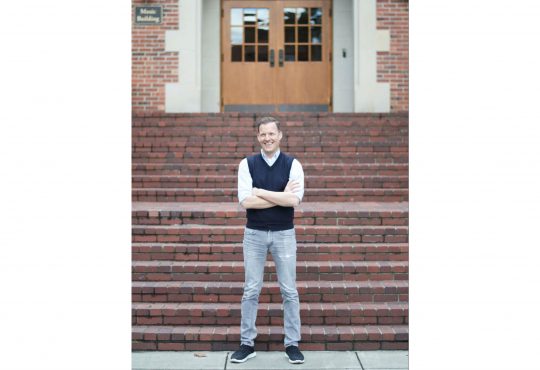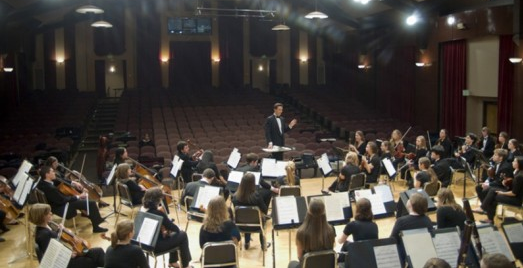
When one hears about a group of four saxophones gathering in one space, it is generally assumed that jazz will be played. On Thursday, March 7 at Schneebeck Concert Hall, these four saxophones went well beyond jazz. Featuring an impressive array of music including Columbian, Middle Eastern, modern and many other influences, the PRISM quartet worked hard to extend any typical repertoire that would be assumed for saxophones.
This performance did not include the normal quartet of men, as Matthew Levy, the founding member, could not be there. Instead, David Wegehaupt replaced him on the tenor saxophone.
Salvatore Sciarrino arranged the first set of the evening. One of the quartet members stood up to introduce it. With each introduction it was proven that the concert went far beyond a musical performance and extended into a deeper musical education.
“As is the tradition of many composers, he [Salvatore Sciarrino] is the scholar of music as the past,” member Taimur Sullivan said.
Sciarrino’s arrangement gave an eclectic taste of music including a madrigal, a piece by Bach and also a piece by George Gershwin.
With each song or movement played, the quartet held an inherent reverence in regard to the history of the music being played. As the players shifted to a piece from a different period, so would their stature and movements. PRISM quartet moved beyond being musicians and also functioned as actors in myriad plays.
The second set was focused on one piece that the newest temporary member, David Wegehaupt brought to the table in light of Matthew Levy’s absence. The piece was one wrought with emotion, as the saxophones would imitate the wailing of loss arranged by the composer. The emotions were well articulated through moments of harmony paired with subsequent moments of dissonance.
The third set was introduced by one of the quartet members, who kept the weather of the Pacific Northwest in mind.
“Along the way legend has it that the composer came up with the music while in the rain,” one of the PRISM quartet members said.
The third set was comprised of two Columbian songs that livened up the PRISM quartet’s performance and gave the concert greater momentum to move forward with.
The fourth set of songs was a compilation of one-minute pieces composed specifically for the PRISM quartet.
“One of the missions of the PRISM quartet for the last 30 years has been to commission new works for the saxophone quartet,” one of the quartet members said.
The fifth and penultimate set was arranged by William Albright and was entitled “Fantasy Études.” This set was one that brought great humor to the concert as the first étude, entitled “Pypes,” narrated the sounds of the bagpipes and eventually the sound of a bagpipe breaking and losing air.
The audience members were certainly convinced of the saxophonists’ talents as they removed themselves from sounding like their native instrument and adeptly imitated the music of bagpipes.
The final set was arranged by Martin Bresnick, who one of the PRISM quartet members described as “one of America’s most dear composers.”
Bresnick’s set was entitled “Everything Must Go” which paid homage to one of Bresnick’s favorite bands, Steeley Dan. They described Bresnick’s composing style as featuring “haunting sounds dealing with micro tonality and dense layering.”
One piece included in the set was entitled “G.L. in Memoriam.” This piece was Bresnick’s memorial to one of his most influential teachers.
“The piece is about the guiding lights of our life that disappear one by one,” one of the quartet members said.
The final set served well to end the concert as it provided the most heartfelt testament to the musicians in our lives, and to the music we hope to affect others’ lives with. The concert ended as modestly as it began. The members of the quartet stood up at the end bowed, and departed without word.
PHOTO COURTESY OF / PRISMQUARTET.COM






